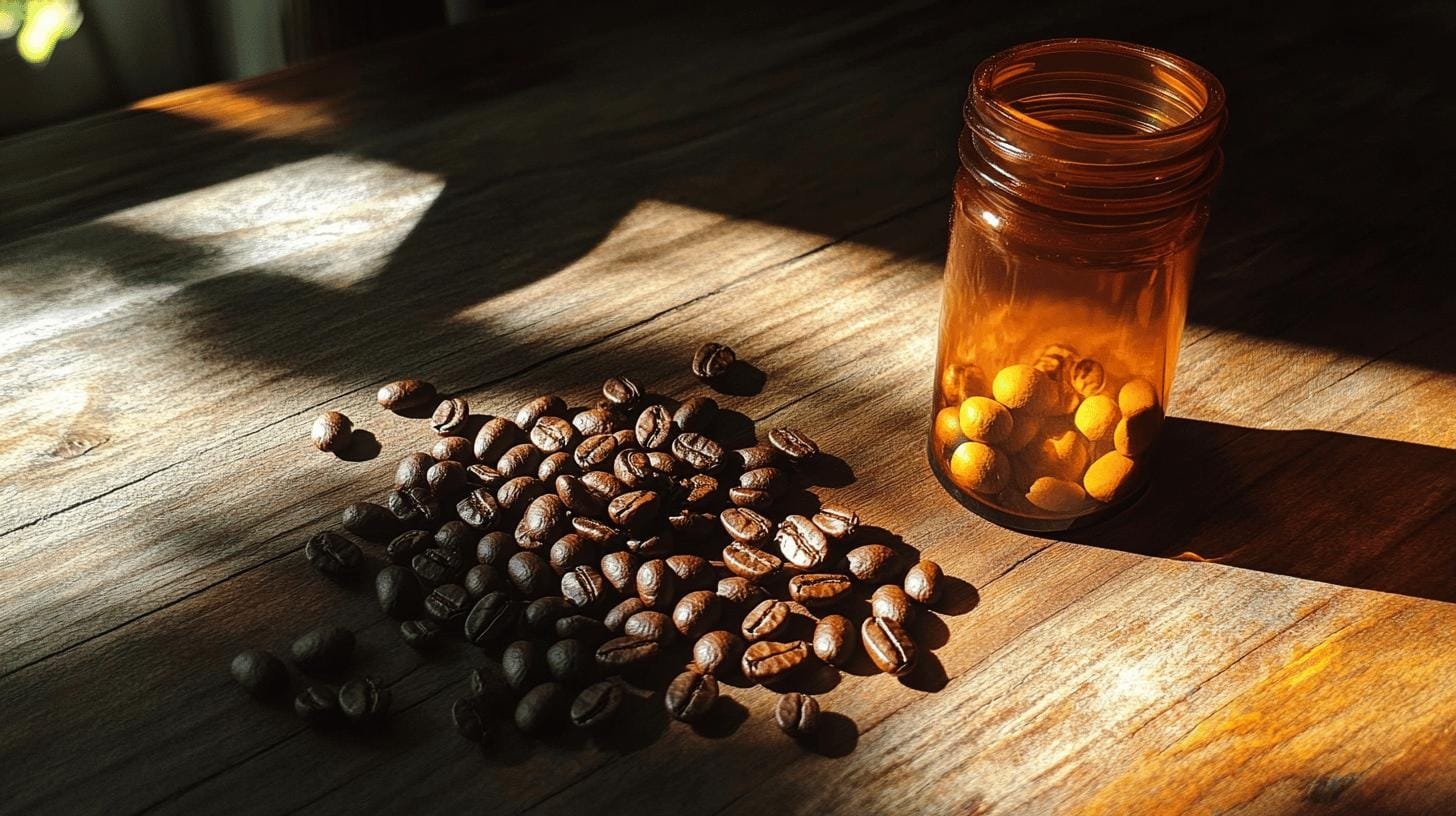
Emerging Approaches Redefining Craft-Focused Customer Experiences
Craft-focused small businesses have always relied on care, precision, and sourcing to stand out. What’s changing now is how those values are shown, not just

Are you sipping your daily brew with natural caffeine, or relying on the synthetic boost from energy drinks? Understanding the subtle differences between natural and synthetic caffeine could redefine your caffeine choices. Natural caffeine, sourced from coffee beans and tea leaves, often contains other bioactive compounds offering additional benefits. Meanwhile, lab-produced synthetic caffeine dominates energy drinks, leading to rapid energy peaks and inevitable crashes. Explore why choosing between these caffeine sources is about more than just energy—it’s about making informed decisions for your health.
Caffeine is a natural stimulant found in over 60 plant species, including coffee, tea, and cacao. It works by blocking adenosine receptors in the brain to increase alertness and energy. Natural caffeine is extracted directly from plants, while synthetic caffeine is manufactured in labs and used in many processed foods and drinks.
People view caffeine differently based on its source. Natural caffeine is often seen as healthier due to its links with plants and extra compounds like antioxidants. On the other hand, synthetic caffeine can be criticized for quick absorption, especially in energy drinks. The FDA considers both types safe, recommending adults consume no more than 400 milligrams daily, reflecting the view that caffeine, if used carefully, can fit into a balanced diet.

Natural caffeine offers energy along with health benefits from compounds present in plant-based sources like coffee, tea, yerba mate, and guarana. Each source provides unique health-promoting compounds.
Coffee is a popular natural caffeine source made from coffee beans. It offers an immediate energy boost and contains antioxidants like chlorogenic acid, which may help reduce inflammation and boost metabolic health. Coffee caffeine can enhance cognitive and physical performance.
Tea leaves, especially from the Camellia sinensis plant, give a milder caffeine effect than coffee. Green and black teas have antioxidants like catechins and flavonoids that support heart health. L-theanine in tea promotes relaxation without drowsiness, balancing caffeine effects.
Yerba mate is a South American drink made from Ilex paraguariensis leaves. It has caffeine and other stimulants like theobromine and theophylline, along with antioxidants such as polyphenols which may lower cholesterol and boost the immune system.
Guarana, native to the Amazon, has seeds with double the caffeine of coffee beans. It offers sustained energy and contains tannins and saponins that may enhance focus. It’s popular in weight management products for its metabolism-boosting potential.
Natural caffeine sources bring added benefits from bioactive compounds such as antioxidants, enhancing metabolism, cardiovascular health, and immunity. Choosing natural options provides a health boost while enjoying the energizing effects of caffeine.
Synthetic caffeine is made in labs, usually using urea and chloroacetic acid. It’s chemically identical to natural caffeine, so it’s popular in energy drinks, sodas, and dietary supplements due to its cost-effectiveness and purity.
Synthetic caffeine absorbs quickly, often causing energy spikes followed by crashes, common in energy drinks. This fast effect may appeal to some, but can lead to issues like increased heart rate, high blood pressure, and more anxiety, especially with high doses.
These effects highlight the need for moderation in synthetic caffeine use. While it provides a potent energy boost, the risks require careful consumption for health and safety.

Both natural and synthetic caffeine work by blocking adenosine receptors in the brain to prevent drowsiness and increase alertness. They differ in absorption rates and the presence of additional compounds, affecting their impact on the body.
Natural caffeine absorbs more slowly due to other compounds like antioxidants in coffee and tea that slow caffeine release, providing gradual energy. Synthetic caffeine, often in energy drinks, absorbs quickly for an immediate energy spike, but can lead to a quicker crash.
Both forms can boost alertness and concentration but can cause anxiety and insomnia if overused. Natural sources like coffee and tea offer extra health benefits through bioactive compounds, improving heart health and antioxidant levels, which synthetic caffeine misses.
Synthetic caffeine can cause rapid heart rate and high blood pressure, especially with other stimulants, posing health risks.
In summary, natural and synthetic caffeine both increase alertness but natural sources offer a more balanced energy release and extra health benefits, mitigating sudden crashes and reducing anxiety risk. Opting for natural sources provides a more complete caffeine experience, enhancing both energy and well-being.
Home-roasting allows control over the process, enhancing caffeine retention in the beans and preserving original compounds for a richer experience compared to heavily processed big brand beans.
Extensively processed big brand beans lose some natural compounds, leading to a uniform taste. In contrast, home-roasted beans maintain more integrity and health benefits from antioxidants and bioactive compounds. By choosing home-roasted beans, you can enjoy a more authentic and potentially healthier caffeine experience.
Delving into the intricacies of natural caffeine vs synthetic caffeine reveals nuanced differences in their origins and effects. Natural caffeine, derived from plants like coffee and tea, provides additional health benefits from bioactive compounds. In contrast, synthetic caffeine, found in energy drinks, can cause rapid energy fluctuations and potential adverse health effects.
When examining health impacts, natural caffeine’s slower release stands out, offering sustained energy with fewer negative consequences. Home-roasted coffee beans, retaining more natural compounds, present a richer caffeine experience than big brand alternatives. Embracing natural sources can enhance health benefits and enjoyment.
Natural caffeine, found in plant sources, might offer advantages like slower energy release and additional beneficial compounds. Regular or synthetic caffeine provides a similar kick but lacks these added benefits.
200 mg of natural caffeine is a moderate dose, typically equivalent to about two cups of coffee. This amount can increase alertness without excessive side effects for most individuals.
Natural caffeine can cause side effects like jitteriness, insomnia, and increased heart rate, particularly in high doses or for those sensitive to caffeine. Moderation is key to minimizing these effects.
Caffeine-rich beverages like tea and coffee are considered healthy sources due to their additional antioxidants and polyphenols, which may contribute to overall health benefits beyond caffeine’s stimulating effects.
Synthetic caffeine is not inherently harmful when consumed in moderation, yet it might lead to rapid energy spikes and crashes. Excessive intake may increase heart rate and blood pressure. Long-term effects include anxiety and insomnia.

Craft-focused small businesses have always relied on care, precision, and sourcing to stand out. What’s changing now is how those values are shown, not just

How can brands create a more balanced and memorable customer experience by blending artisanal product quality with thoughtful everyday rituals that keep people coming back?

Independent coffee shops have always been about more than caffeine—they’re hubs of creativity, connection, and care. As café culture continues to evolve, new trends are

Introduction Independent cafes win when they feel like the neighborhood’s living room and operate with the discipline of a great kitchen. Below is a quick

Discover how top specialty coffee brands create lasting loyalty through storytelling, sourcing, and community connection. Real tips from 6 industry experts.

Discover the ultimate showdown between two beloved coffee brewing methods: the French press and Chemex. Explore how each technique caters to distinct palates, with the French press delivering bold flavors and the Chemex presenting a bright, clean taste.

Unlock the secrets to brewing the perfect cup of coffee with our comprehensive guide on using a coffee scale. Discover how precise measurements enhance flavor and consistency while eliminating bitterness.

Discover how water temperature plays a vital role in brewing the perfect cup of coffee. This article delves into the ideal temperature range of 195°F to 205°F for optimal flavor extraction, enhancing the enjoyment of high-quality beans.

Discover the world of curated specialty coffee bundles, perfect for enthusiasts seeking quality and craftsmanship. This article explores the benefits of ethically sourced, small-batch beans from brands like Equipoise Coffee, offering diverse flavor profiles that elevate your brewing experience.